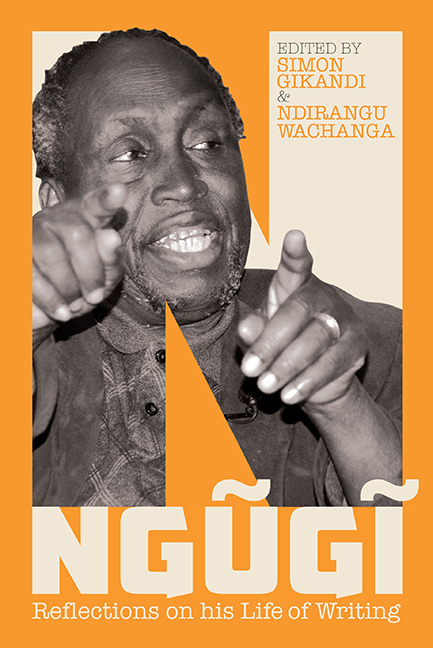Book contents
- Frontmatter
- Contents
- Preface
- Acknowledgements
- Chronology
- Photographic Section
- Introduction: Ngũgĩ wa Thiong'o: Reflections on His Life of Writing
- Ngũgĩ at Work
- Part I Serenades & Beginnings
- 1 Hyperbolic Praise Poetry for Ngũgĩ @80 … In Imitation of African Orature
- 2 A Song at Dawn (for Ngũgĩ wa Thiong'o)
- 3 Ngũgĩ in Eritrea
- 4 Up From Makerere: On the Publication of Weep Not, Child
- 5 Encountering Ngũgĩ at Leeds: An Interview with Peter Nazareth
- 6 The Book that Made Me: On Weep Not, Child
- 7 Note from a Literary Son
- 8 What is in a Name?
- 9 In Exile: Between Britain & Kenya
- Part II Memories, Recollections & Tributes
- Part III Working with Ngũgĩ
- Part IV The Writer, the Critic & the World
- Part V The Other Ngũgĩ
- Appendixes
- References
- Bibliography of Ngũgĩ's Primary Works
- Works Cited
- Notes on Contributors
- Index
8 - What is in a Name?
from Part I - Serenades & Beginnings
Published online by Cambridge University Press: 27 July 2019
- Frontmatter
- Contents
- Preface
- Acknowledgements
- Chronology
- Photographic Section
- Introduction: Ngũgĩ wa Thiong'o: Reflections on His Life of Writing
- Ngũgĩ at Work
- Part I Serenades & Beginnings
- 1 Hyperbolic Praise Poetry for Ngũgĩ @80 … In Imitation of African Orature
- 2 A Song at Dawn (for Ngũgĩ wa Thiong'o)
- 3 Ngũgĩ in Eritrea
- 4 Up From Makerere: On the Publication of Weep Not, Child
- 5 Encountering Ngũgĩ at Leeds: An Interview with Peter Nazareth
- 6 The Book that Made Me: On Weep Not, Child
- 7 Note from a Literary Son
- 8 What is in a Name?
- 9 In Exile: Between Britain & Kenya
- Part II Memories, Recollections & Tributes
- Part III Working with Ngũgĩ
- Part IV The Writer, the Critic & the World
- Part V The Other Ngũgĩ
- Appendixes
- References
- Bibliography of Ngũgĩ's Primary Works
- Works Cited
- Notes on Contributors
- Index
Summary
‘I am not a man of the Church. I am not even a Christian.’ Those were the stunning words with which James Ngũgĩ opened his talk to the Fifth General Assembly of the Presbyterian Church of East Africa in Nairobi in March 1970, reproduced in this collection [i.e. in Homecoming] as ‘Church, Culture and Politics’. He had hardly ended his address when a wiry old man visibly choking with anger leapt to the floor, and, shaking his walking-stick menacingly towards the front, warned the speaker to seek immediate repentance in prayer. The old man did not forget to add as a reminder that in spite of his shameless denial and all his blasphemy, the speaker was a Christian, and the evidence was his first name. Ngũgĩ had never given serious thought to this contradiction. Now it struck him that perhaps the old man had a point, and the name James, an unfortunate anomaly, had to go. This volume of essays is James Ngũgĩ's first major publication under his new name. Those who might retort with ‘What's in a name?’ should ask themselves why several African countries have changed their names during the last fifteen years, and why in the Republic of Zaire (itself a recent adoption) a name-changing revolution has swept through an entire Cabinet. The change in Ngũgĩ's name is in itself perhaps of little consequence. What lends it some importance for our purpose is its significance in the wider context of the writer's beliefs, particularly as the heresy which shocked the Presbyterian congregation in Nairobi forms an essential part of those beliefs. This foreword cannot attempt a detailed evaluation of Ngũgĩ's thought. What it seeks to do is merely to direct the reader's attention to some of its major features as revealed by these essays, and offer a few background comments in addition towards a richer appreciation not only of the essays themselves but also of the writer's creative work.
- Type
- Chapter
- Information
- NgugiReflections on his Life of Writing, pp. 53 - 56Publisher: Boydell & BrewerPrint publication year: 2018



